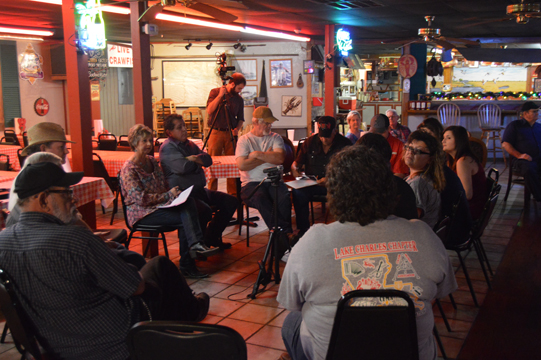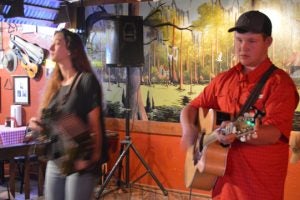Cajun traditions: Contest becomes discussion on keeping music alive
Published 6:13 pm Tuesday, February 27, 2018

- Musicians, organizers, fans and general members of the public gathered on Saturday at Larry’s French Market to discuss traditional music, Cajun culture and youth participation for Texas Folklife’s 2018 Big Squeeze Contest. (Lorenzo Salinas/The News)
By Lorenzo Salinas
There were no contestants for the contest, but that didn’t stop folks from finding new and inventive ways of keeping the music alive.
Texas Folklife hosted the 2018 Big Squeeze Accordion Contest Saturday at Larry’s French Market in Groves. The event served as a venue for community discussion on traditional Cajun music and culture as well as live music performed by Cajun and Zyedo artists young and old.
“We’re a nonprofit from Austin that’s here to present, preserve and celebrate the diverse music and tradition of Texas,” Charlie Lockwood, executive director with Texas Folklife, said.
The Big Squeeze is a program meant to encourage and showcase young, up-and-coming Texas musicians who play accordion-centered music in genres like Cajun, Zydeco, conjunto, polka and Tejano.
“For 12 years the Big Squeeze has showcased these artists, and this is one of our favorite communities to work with,” Lockwood said.
This year’s contest had no participants however, but that dovetailed well with the themes for the roundtable discussion Lockwood had set up — namely, the needs for youth participation in traditional music; how Texas Folklife could encourage those needs; and how arts organizations, supporters, school music teachers and others could work together to make that happen.
Trending
Lockwood expressed a few ideas for the themes — finding teachers or mentors to help young people learn about Cajun music; getting the community to support young people’s efforts; and, finally, advocating young people’s talents to the community at large.
“To move forward we have to look back,” Gloria Ray said during the community discussion.
Ray argued that one of the failing points for getting young people exposed to traditional Cajun music was a lack of venues in the Southeast Texas area.
“Back then, when you had all these kids grow up, you had places like the Rodair Club where they had the chance to go on stage and play live music,” she said. “But you don’t have places like that dedicated to it anymore.”
The original Rodair Club closed in 2004. Ray said that when places like that closed, the opportunity for the next generation of musicians to learn and get steeped within the tradition started to decline as well.
“We need a facility or venue that lends itself to that,” Ray said.
Others in the 16-person discussion agreed, emphasizing that there needed to be a venue where family-centered outings — and therefore all-ages permitted — could be enjoyed.
Lockwood brought up the issue of suitable teachers, and others echoed his statement.
Ed Poullard noted the difference between the availability of teachers in Louisiana and Southeast Texas. He pointed out that one was more dedicated than the other.
“In Louisiana, you have teachers who are supporting 150 percent of everything the younger musicians want to do,” he said. “There are a whole lot more local classes there than there are here.”
Poullard argued that people in Southeast Texas focus more on family than on music, calling music “secondary” to how it is in Louisiana.
As a result, young people “don’t have the opportunity to scratch that (musical) need when it presents itself.”
One of the dominant issues during the discussion was the topic of traditional music and how readily it accepts or rejects outside influences, particularly among young people.
“They want to learn the music of their generation,” Poullard said.
Lockwood said he had seen instances where the next generation of accordion musicians have incorporated new elements from other genres and cultures into the music they make today.
One member remarked how if young people made music that appealed to their modern sensibilities then that wouldn’t entice the older generation to listen to it and vice versa.
Still, a large portion of Cajun music is derived from the language, something that Jude Moreau commented on during the talk.
“It’s not just the music, it’s the language and whole culture,” he said.
Moreau is bandleader of the Bon Temps Playboys and a Cajun Music Hall of Famer.
Ray agreed, contending that the music was only a part of the larger culture it was birthed from.
“I spoke with a (professor) at Lamar, and he feels that it’s also the dancing — if there’s no dancing, then there’s no music that will be played. When young people come out, they don’t dance,” Ray said. “We’re losing our language because we don’t have anyone to speak it with.”
Another roundtable participant said it was important to get music educators in schools to encourage and introduce the genre to their students. He also suggested some type of incentive to get young people up on stage, whether that is through money or by having someone else play on stage with them so as to not let them get stage fright.
Elizabeth Kelley, the 2015 Big Squeeze winner in the Cajun/Zydeco category, said that it was important to get kids started young in traditional music.
She started playing when she was 7, and she suggested a public institution like the library to get kids exposed to Cajun and other types of music at a young age.

2015 Cajun/Zydeco winner Elizabeth Kelley and 2017 Cajun/Zydeco winner Donovan Bourque perform Saturday after the roundtable discussion at Larry’s French Market in Groves. (Lorenzo Salinas/The News)
Kelley, Moreau and 2017 Cajun/Zydeco winner Donovan Bourque performed after the roundtable discussion had come to a close.





